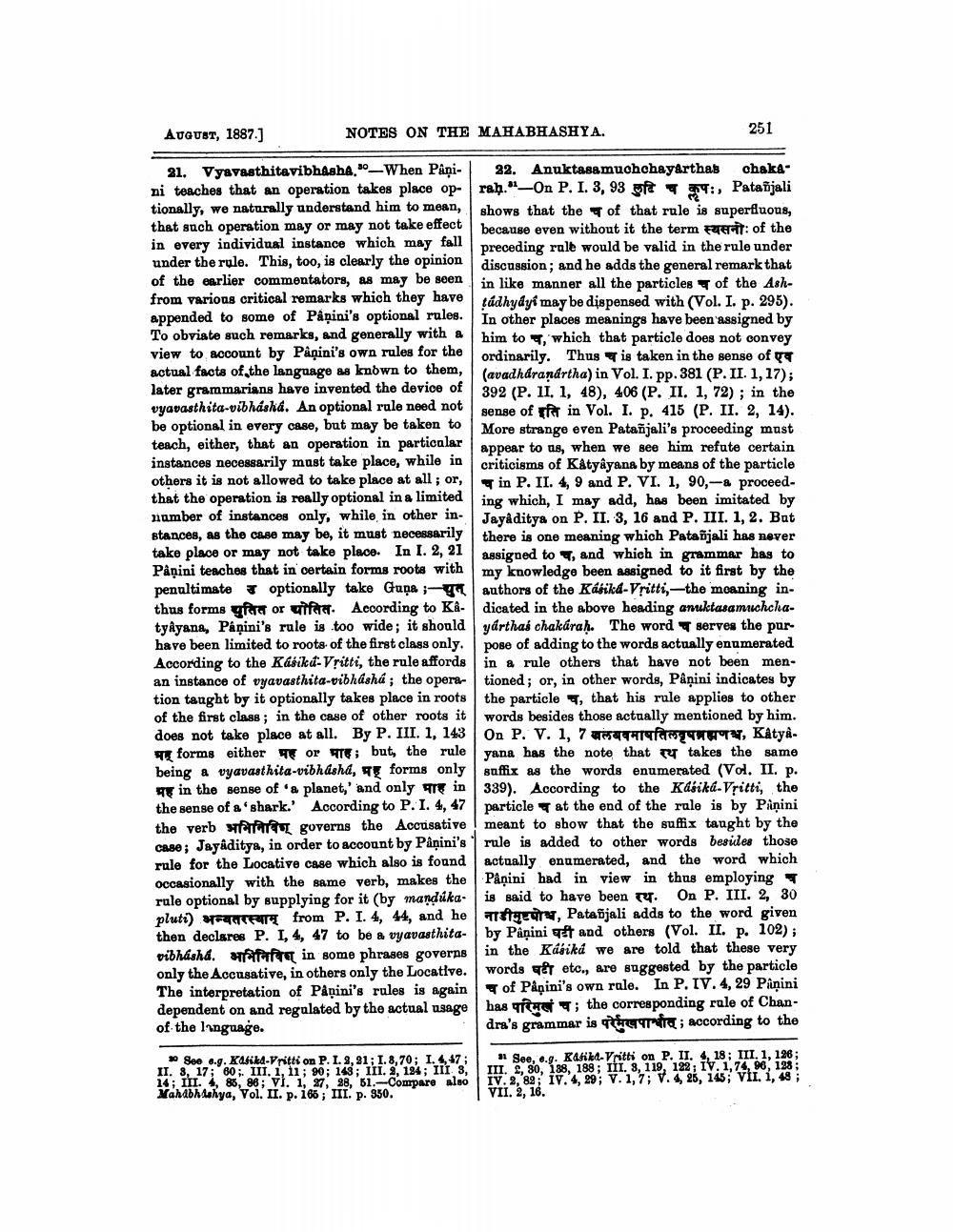________________
AUGUST, 1887.)
NOTES ON THE MAHABHASHYA.
251
21. Vyavasthitavibhasha."-When Paņi- 22. Anuktasamushohayarthas chakani teaches that an operation takes place op- rah."-On P. I. 3, 93 ft 34:, Patañjali tionally, we naturally understand him to mean, shows that the of that rule is superfluous, that such operation may or may not take effect because even without it the term fuerit of the in every individual instance which may fall
instance which may Tall preceding role would be valid in the rule under under the rule. This, too, is clearly the opinion
discussion; and he adds the general remark that of the earlier commentators, as may be seen
in like manner all the particles of the Ashfrom various critical remarks which they have
túdhydyi may be dispensed with (Vol. I. p. 295). appended to some of Påņini's optional rules.
In other places meanings have been assigned by To obviate such remarks, and generally with a
him to , which that particle does not convey view to account by Påņini's own rules for the
ordinarily. Thus Tis taken in the sense of actual facts of the language as known to them, (avadhdrandrtha) in Vol. I. pp. 381 (P. II. 1, 17); later grammarians have invented the device of
392 (P. II, 1, 48), 406 (P. II. 1, 72); in the
399 (P. 1. A) vyavasthita-vibhasha. An optional rule need not
sense of fa in Vol. I. p. 415 (P. II. 2, 14). be optional in every case, but may be taken to
More strange even Patañjali's proceeding must teach, either, that an operation in particular
appear to us, when we see him refute certain instances necessarily must take place, while in
| criticisms of Kâtyâyana by means of the particle others it is not allowed to take place at all; or, in P. II. 4, 9 and P. VI. 1, 90,-& proceedthat the operation is really optional in a limited
ing which, I may add, has been imitated by zamber of instances only, while in other in Jayaditya on P. II. 3, 16 and P. III. 1, 2. Bat stances, as the CABO may be, it must necessarily there is one meaning which Patañjali has never take place or may not take place. In L. 2, 21
assigned to and which in grammar has to Påņini teaches that in certain forms roots with my knowledge been assigned to it first by the penultimate optionally take Guna - authors of the Kásikd-Vritti,-the moaning inthus forms पुतित or घोतित. According to Ka-| dicated in the above heading anuktasamuchchatyAyana, Panini's rule is too wide; it should ydrthas chakarah. The word serves the pur have been limited to roots of the first class only. pose of adding to the words actually enumerated According to the Käsikd-Vritti, the rule affords in a rule others that have not been menan instance of vyavasthita-vibháshá; the opera- tioned; or, in other words, Pâņini indicates by tion taught by it optionally takes place in roots the particle 4, that his rule applies to other of the first class; in the case of other roots it words besides those actually mentioned by him. does not take place at all. By P. III. 1, 143 On P. V. 1, 7 Watam a TN, Kâtya
forms either or ; but, the rule yana has the note that takes the same being a vyavasthita-vibhasha, forms only suffix as the words enumerated (Vol. II. p. qy in the sense of a planet,' and only in 339). According to the Kdóika.Vritti, the the sense of a shark.' According to P. I. 4, 47 particle at the end of the rule is by Paņini the verb ret governs the Accusative! meant to show that the suffix taught by the Case; Jayaditya, in order to account by Påņini's 1 rule is added to other words besides those rule for the Locative case which also is found actually enumerated, and the word which occasionally with the same verb, makes the Påņini had in view in thus employing rule optional by supplying for it (by mandiika- is said to have been . On P. III. 2, 30 pluti) RT from P. I. 4, 44, and heartgers, Patañjali adds to the word given then declares P. I, 4, 47 to be a vyavasthita- by Paņini and others (Vol. II. p. 102); vibhasha. aprilafr in some phrases governs in the Kdáikd we are told that these very only the Accusative, in others only the Locative. words of etc., are suggested by the particle The interpretation of Paņini's rules is again of Påņini's own rule. In P. IV. 4, 29 Paņini dependent on and regulated by the actual usage has the T; the corresponding rule of Chanof the language.
dra's grammar is tard; according to the
* See o... Kakka.Vnitti on P. L. 9,91; 1. 8,70; I. 4, 47: II. 8, 17:80: III. 1, 11 ; 90; 148; III. 3, 194; III 3, 14; III. 4, 85, 86; VI. 1, 27, 28, 61.-Compare also Mahabhtahya, Vol. II. p. 166; III. p. 350.
"See, e.g. Kalikt. Vith on P. II. 4,18; III. 1, 126; III. £, 80, 188, 189; III. 8, 119, 122; IV. 1,74.90, 198 ; IV. 2, 82 IV. 4, 29; V. 1,7; V. 4, 25, 145; VII, 1, 48; VII. 2, 16.




